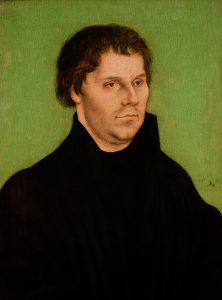On April 14, 1521 Martin Luther wrote the following words in a short letter to Georg Spalatin from Frankfurt-am-Main:
I am coming, my Spalatin, although Satan has done everything to hinder me with more than one disease. All the way from Eisenach to here I have been sick; I am still sick in a way which previously has been unknown to me. Of course I realize that the mandate of Charles has also been published to frighten me. But Christ lives, and we shall enter Worms in spite of all the gates of hell and the powers of in the air.*
Two days later, Martin Luther entered Worms. The bells of Worms Cathedral announced his arrival and a large crowd welcomed him. On this two-week journey Luther had preached to overflow crowds in Erfurt, Gotha, and Eisenach. He did become ill during this journey and was even bled. In 1520 Luther’s publications had made him a famous man. However, his writings also led to his excommunication by Pope Leo X in January 1521.
The young Holy Roman Emperor, Charles V, agreed to grant Luther a hearing before the Diet of Worms in 1521. Then, Charles and the diet would decide whether Luther would become an outlaw as a notorious heretic. Diets consisted of large meetings of the princes of the Holy Roman Empire of the German Nation. The German princes (both secular and ecclesiastical leaders) guarded their power and often sought to limit the emperor.
The imperial officials summoned Luther to address the gathering in the episcopal palace in Worms on the afternoon of April 17. On that morning Luther heard an ailing knight’s confession and celebrated communion with him. When he appeared before the august assembly of the leaders of the imperial estates, Luther did seem intimidated. The official speaker for Charles V asked if Luther acknowledged a group of his published books and if he desired to retract anything written in them. Luther recognized the books as his own. However, he then requested time to consider his answer to avoid “violence to the divine Word and danger to his own soul.” The imperial court granted Luther one day to consider.
The following day, April 18, around 6 pm, the imperial spokesman again asked Luther to acknowledge his books and if he wished to retract any of his work. Based upon the record of his speech, it’s clear that Luther had used the extra day to refine his answer and perhaps practice his speech. First, he acknowledged that he wrote the books and would not retract the theology expressed therein. Then, Luther explained that his work varied in style and in content. Some of his books, for example, addressed moral and religious topics with which no one disagreed. Luther then explained that other books attacked the papal teachings and corruption. Lastly, he recognized that he had written some books against private individuals and he admitted that he could err. Luther always wanted to focus on the Holy Scriptures as he explained:
“To see excitement and dissension arise because of the Word of God is to me clearly the most joyful aspect of all in these matters. For this is the way, the opportunity, and the result of the Word of God, just as He [Christ] said, ‘I have not come to bring peace, but a sword. For I have come to set a man against his father, etc.’ [Matt. 10:34-35]. Therefore, we ought to think how marvelous and terrible is our God in his counsels, lest by chance what is attempted for settling strife grows rather into an intolerable deluge of evils, if we begin by condemning the Word of God.”**
Luther concluded by reminding his hearers that all must fear God and he commended himself to the emperor and the German princes. It was only then in response to the imperial spokesman’s statement that he should give a simple answer that Luther famously proclaimed:
Unless I am convinced by the testimony of the Scriptures or by clear reason (for I do not trust either in the pope or to councils alone, since it well known that they have often erred and contradicted themselves), I am bound by the Scriptures I have quoted and my conscience is captive to the Word of God. I cannot and I will not retract anything since it is neither safe nor right to go against conscience. I cannot do otherwise, here I stand, may God help me. Amen.***
*Martin Luther, Letter 71, Luther’s Works 48: 198.
**Luther at the Diet of Worms, LW 32: 111.
***Ibid., 112-113. The last sentence in bold print above is in German in the Latin text.


